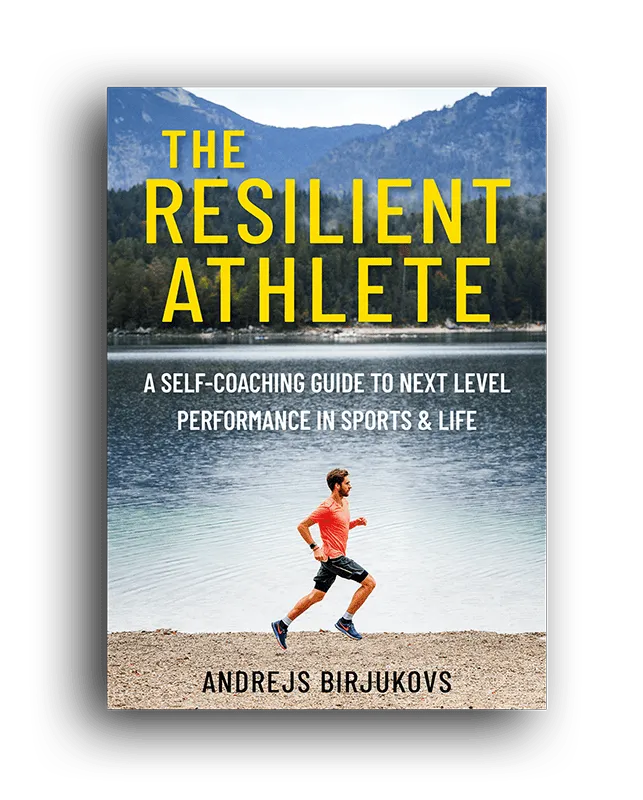If I asked you to picture an endurance challenge, what would you think of? I bet running a marathon would be one of the first things that come to mind. After all, it’s one of the most popular bucket list items.
Now imagine running a marathon every day, covering almost 300km (183mi) in a single week. That’s volume that even elite marathoners don’t achieve at the peak of their training. Think of all the recovery and nutrition you’d need to make it through such week..
And now the caveat – you have no control of any of that because these marathons take place on a different continent every day and the carefully catered recovery routine is messed up by constant travel.
This is exactly what Ahmet asked me to coach him for.
Extreme endurance challenge
Such extreme challenge does not have training plans available. Simply because there are less than 400 people who have ever attempted it. And, logically, no one-size-fits-all plan could cater for all the individual variables (training, lifestyle, nutrition, injury history, etc.).
When Ahmet asked me to coach him I knew that physical conditioning would only account for 50% of success. The rest would come down to mental resilience. And I was right – the whole journey was anything but smooth sailing, but over a 2-year period we got it done! And he even hooked me up on this extreme endurance challenge as well.
I asked Ahmet to share his view on this journey and will publish it here with my comments as a coach.
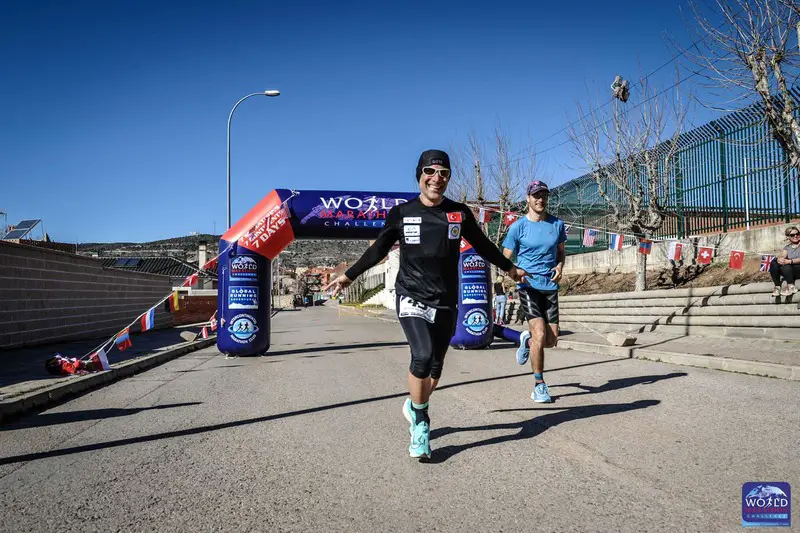
Running 7 marathons on 7 continents in 7 days
Completing 7 marathons on all 7 continents is a lifelong dream for many runners. But doing so in a span of just 7 days?
Such gruelling test of endurance and grit is known as the World Marathon Challenge, where elite and everyday athletes push their bodies to the limit, battling jet lag, extreme weather, and sheer exhaustion.
World Marathon Challenge
WMC is a logistical and physical challenge to run 7 marathons on 7 continents in 7 days, or 168 hours. The first marathon takes place at Novo (Antarctica) and is followed by marathons in Cape Town (Africa), Perth (Australia), Dubai (Asia), Madrid (Europe), Fortaleza (South America) and Miami (North America).
Some might say that there are only 6 continents (Asia and Europe both forming Eurasia) and that’s true. But number 7 fits so well with the 7 days narrative.
And when you’re already sold on 6, one more comes as a ‘package deal’.
Athlete profile: business owner & hands-on dad
Ahmet is a very positive and determined individual. You’d (almost) never see him not smiling. It’s one of his strengths and, probably, a way to balance a highly ambitious character with his intense lifestyle.
By the way, Ahmet is not a newcomer to ultra endurance events. His longest adventure was running across Turkey, covering 1,650km over 40 days. So, when he reached out to me, he was serious. In fact, so serious that he has already signed up for the 7-7-7 race with almost a year to go.
In the end, the journey took us almost 2 years (the event was postponed multiple times due to Covid-19). And while more time might seem like a good thing, it wasn’t. After building up the fitness and resilience we had to maintain that peak throughout more flu seasons and business trips. Not the easiest thing to do.
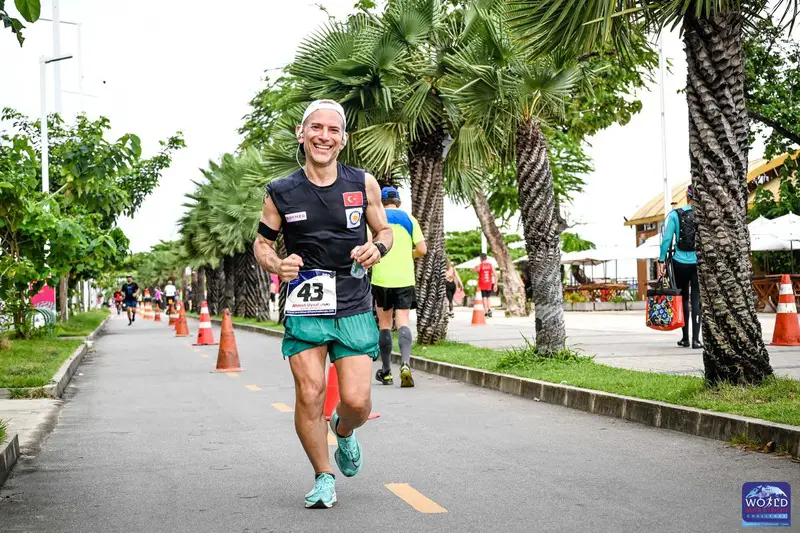
Here’s what Ahmet himself says about the journey:
Tell me about yourself and your lifestyle. How does your typical week look like?
Ahmet: I own a craft brewery in Istanbul and İzmir (Turkey). We make award-winning beers in state-of-the-art facilities installed in beautifully restored century old factories. I oversee the whole operation from laying the first brick to the bottle, but I am usually not involved in day-to-day matters. However,
As a business owner, my day is very busy.
I have three children turning 5, 15, and 20 this year. I am a 100% hands on fully involved father. My day has started by taking a child to school for 18 years now.
I am quite social and would prefer to go out 7 nights of the week (if my partner could keep up). I also have a good appetite for sweets and enjoy a drink or two most nights of the week. There is time for everything since I don’t enjoy sleep that much.
Why did you sign up for the the World Marathon Challenge?
Ahmet: I like unique endurance challenges and I am not afraid of hurdles. I enjoy the endurance side of all things. Work or play, it does not matter. I like travelling and discovering new places. The WMC seemed like the ultimate sports fantasy event in many ways for me.
Coach’s (Andrejs) view: I think Ahmet has downplayed his lifestyle a bit. Over the years I coached him, his days were always fully booked and scheduled down to minutes, including social time. Somehow, he manages to cram into a single week what most of us can do in a month. But his diligent scheduling and army-like discipline was one of the core success factors. He scheduled every training session as an appointment in his calendar to make sure it has priority. As a result, he completed almost everything what was in the plan – and the progress was very controlled. This also made it easier for me to plan ahead and revisit earlier training to replicate successful blocks/patterns. Sure, we made adjustments (often on a daily basis) based on Ahmet’s recovery and progress, but the overall approach remained firm.
Read also: 18 Practical Time Management Hacks For Athletes And Busy People
The preparation process
Let’s now look at the training process and what specifically did we do to prepare the body & mind for the event. Here’s what Ahmet had to say:
What’s your fitness background? How did you train before you embarked on this journey?
Ahmet: I have been running on and off since 2003. I had run around 10 marathons, including the North Pole marathon. In the spring of 2018 I ran across Turkey – 1,650km in total, averaging 40km per day. Besides that, I have years of rock-climbing and alpine style climbing experience, also long treks in the alps and in the Himalayas.
Previously I would prepare my own training programs for the marathons based only on ramping up distance without any focus on time or efficiency.
How did this extreme endurance challenge change your training & lifestyle?
Ahmet: Through a running friend I met Andrejs and realized the science that I could apply to my training. This time I was intending to focus not only on finishing, but also enjoying myself while doing a respectable time. I also wanted to tap into know-how that would prevent injuries before and during the event.
The training plan Andrejs designed had room for almost 100% of what I do on a daily basis (including even my not-so-athlete habits). He always found playful ways to make running enjoyable, even as we ramped up to 20+ hour weeks. I did end up cutting sweets and alcohol a little (not forced at all) towards the end. I was also more aware of areas of improvement as I realized tailored expertise was available.
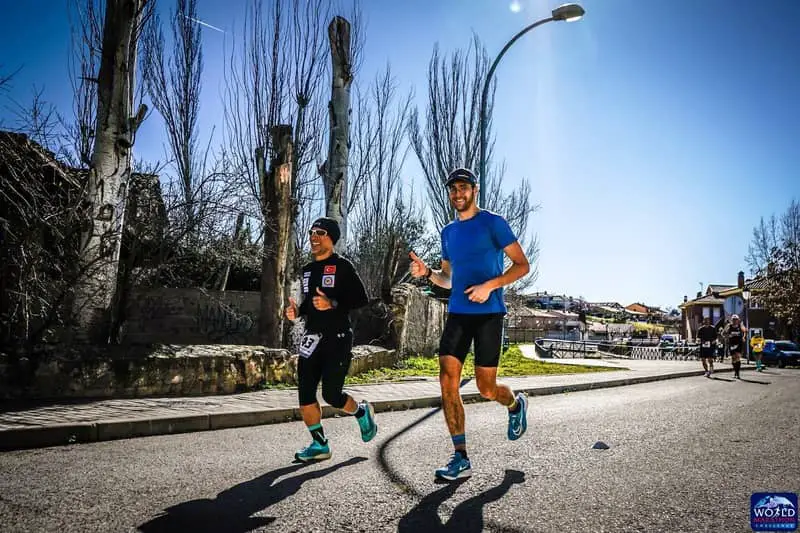
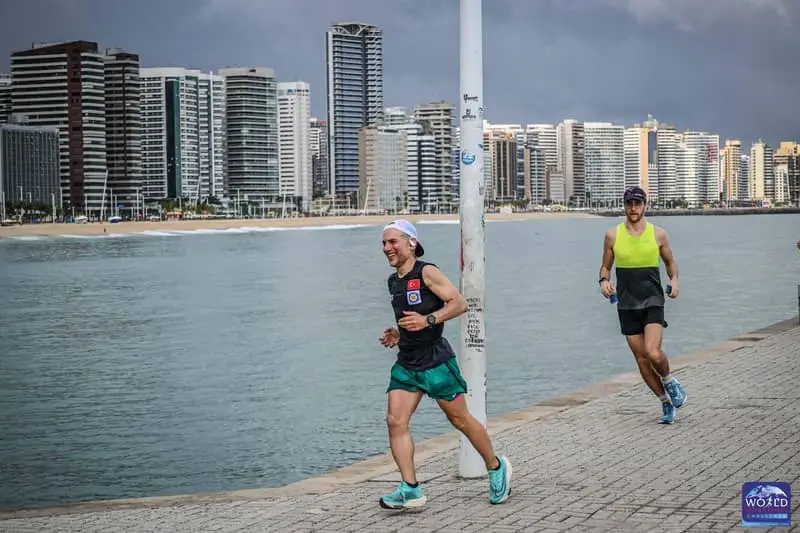
How did Andrejs help you prepare for this extreme endurance challenge – mentally & physically?
Ahmet: First of all, there is a lot of science behind the training approach that Andrejs has. He tackles the science and data like a professor and is very good at teaching or explaining it. As he is also an athlete himself, he has seen everything. He is able to understand the psychology of a client and adapt to it. So the method is not military. In fact, the plan was meant to be fun and enjoyable.
Another thing I appreciated a lot was that he does not refrain from searching for and finding solutions to individual problems.
Andrejs is a good listener, he has the knowledge and experience, and most of all, he cares!
Coach’s (Andrejs) view: Ahmet didn’t mention much from the training principles here, so I’ll cover those. To tackle this beast of a race we designed a series of monthly mini-challenges that would act as, sort of, signposts along the way. And we trained with those in mind – not necessarily the 7-7-7 as a whole. This was beneficial both from physiological perspective (gradual increase in load) and psychological (boosting confidence after every smaller achievement). For example, we first trained for a faster marathon. After that, for a back-to-back marathon + half marathon. Then for 2 marathons on subsequent days. Then for 3 over a span of 4 days. And the final boss and ultimate rehearsal was 7 half marathons over 7 days.
Read also: Heart Rate Training Zones – Complete Guide To Endurance Gains
Because Ahmet didn’t have an organized running background, we focused on building low intensity mileage to improve his aerobic base and functional strength. Most of the sessions included some structured Zone 3 intervals and once every 7 days (sometime 10 days) we would do speedwork in Zone 4 (either holding a pace or shorter intervals). That was the core of the program.
Test of resilience – the World Marathon Challenge
This is where it gets even more exciting. We’re getting into the details of this endurance challenge. Here’s Ahmet’s feedback:
What was the most challenging – in training and during the week itself?
Ahmet: I would still say time management was the most challenging as family and work was very demanding before this endurance challenge.
I think physically and mentally I was so well prepared for the event (for the target finish time) that effort wise, I never even felt tired.
Unfortunately, I had knee trouble starting in marathon 4. I did not see a doctor afterwards, so I don’t have a 100% diagnosis. But I am almost certain it was IT band related. It was similar pain that I had 5 years ago in the run across Turkey. The pain was so bad during marathons 6 and 7 that the amount of pain killers I had to take had a big toll on my kidneys and digestive system.
If I were to do it again, I would prepare myself to be more relaxed. In particular, about food & nutrition and especially hygiene issues. The essentials (my preparation) were there, so there was no need to worry of finishing. Improving the conditions was also not possible. So, it was a strictly physical and mental effort to get through the week.
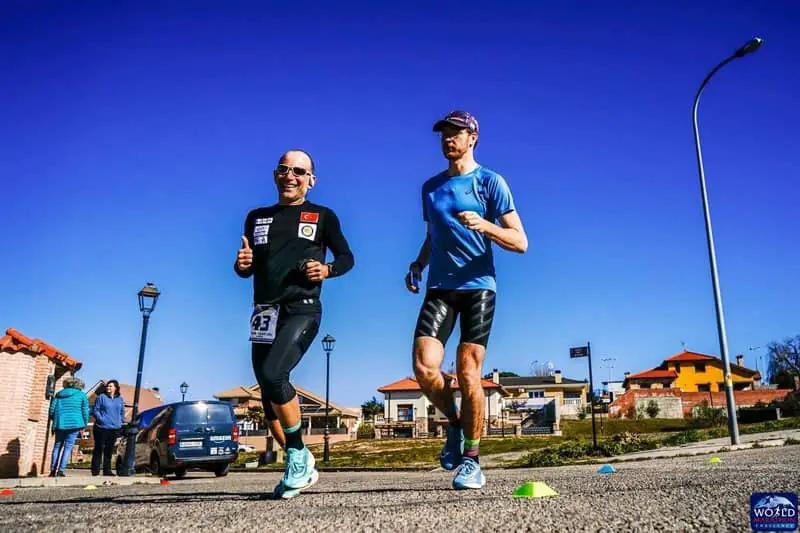
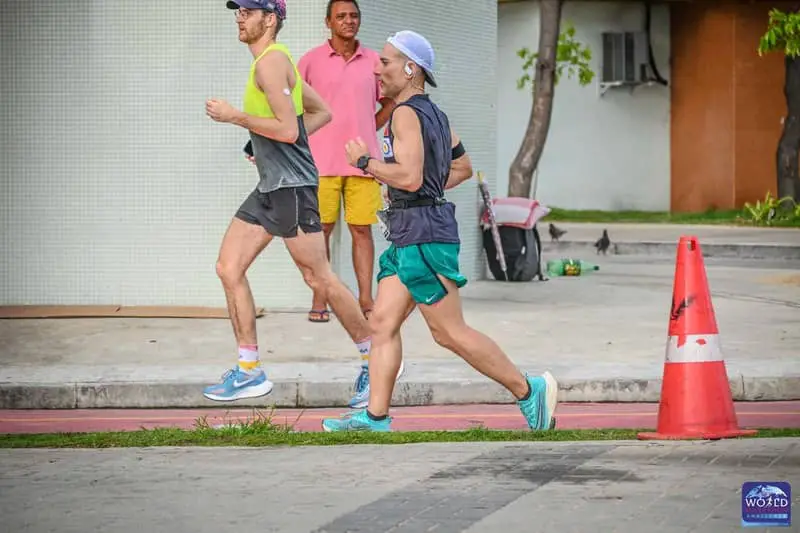
Overall, I am very satisfied with the end result. My result was 13th overall, finishing 8th and 9th in two races. I had intended to finish somewhere between 30-35 hours in total and I did the challenge in 32hrs 32mins. It would have been ~2hrs faster without the knee troubles.
Coach’s (Andrejs) view: Ahmet is very right about relaxation. Running 7 marathons in 7 days around the world is an extreme endurance challenge during which a lot of things can (and probably will) go wrong. Most of these factors are outside of our control (like weather, travel delays, type of nutrition offered on the course). Stressing about everything that can go wrong is very exhausting. Instead,
The best way to approach such an event is to treat it as an adventure and embrace the unknown.
Focus on what you can control (preparation and mindset) and let go of what you can’t control. Embrace the uncertainty and live in moment. This is called emotional resilience.
During this endurance challenge Ahmet faced quite a few things he could not predict. First of all, the group had to depart to Antarctica on a short notice at 6pm (instead of 6am the next day) due to oncoming snowstorm, so no proper sleep at the start. In Antarctica the weather deteriorated quicker than anticipated and the marathon took place during an actual snowstorm, making it harder and longer. On top of that, after the second marathon in Cape Town they couldn’t fly out for 2 days due to paperwork issues, which meant the next 5 marathons had to be squeezed into 3.5 days (forget about recovery). And that’s even before scorching marathons in Australia, Dubai and Brazil..
Read also: How To Develop Unshakeable Confidence Through Emotional Resilience
Ahmet couldn’t control any of it, so our strategy was to focus on the next race and maximize recovery as much as possible. This was the only thing he could actually control.
I joined Ahmet in Madrid for marathon #5 to support mentally. That was also when the real effect of fatigue and sleep deprivation kicked in. Most of the runners started to struggle and earlier niggles & discomforts turning into full-on injuries. We did include a few hip release and strength & mobility exercises to alleviate the knee pain Ahmet was experiencing, but this late into a challenge their effect was limited.
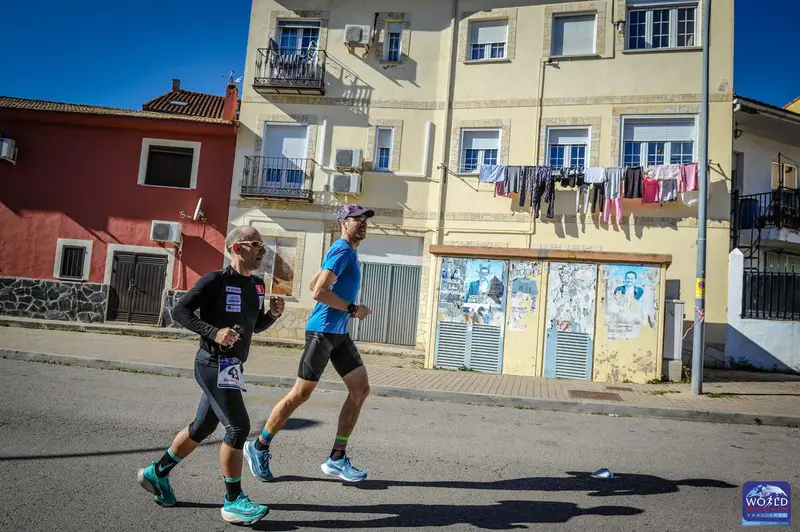
Reflections after extreme endurance challenge
What advice do you have for others training for the World Marathon Challenge?
Ahmet: I think it’s something not to be taken lightly. Set a good target for yourself and stick to it. Know your limits but remember that you can push them with proper training. Follow the plan – it’s hard work but it’s worth it. It’s the endurance challenge of a lifetime. The more effort you put in beforehand, it will pay off big time during the event.
When you look at videos or pictures, one will see that there is a big variety of age group or fitness level among the competitors but that may be misleading. Almost all competitors have huge grit and they are mentally very tough. They also have different targets. Some opt for half marathons or simply walk to finish.
In my opinion there HAS to be a well planned target and a workout plan. I would suggest a minimum of 1 year of tailored preparation for a seasoned runner, or 2 years for a casual runner. The focused Zone 2 plan worked out great for me. I was able to run marathons 2-3-4-5 with a fixed pace like a freight train.
We had built a very strong aerobic engine and also enough core body strength that I did not have muscle fatigue at all. However, nutrition and recovery should also be very well thought out as there is very little time between marathons and there is no time to waste. Every chance to rest, while in a check in line, or waiting for luggage or wait times after each marathon should be used efficiently.
Also, think through the pacing, recovery and travel gear (clothes, shoes, accessories) – every small misstep can be aggravated over a week. Even selection of luggage is critical as there is a lot of moving around and hauling bags. In preparation, we discussed and tested compression tools, as well as foam rolling to use for recovery. These all proved to be very useful in the end.
Coach’s (Andrejs) view: I fully agree with Ahmet here. Having a clear plan that is tested in training and sticking to it is a major part of success. And it makes the whole journey more enjoyable, as you get to relax mentally and immense in the experience.
In training, find the pace you can sustain for a long time and practice running your long runs (and back-to-back runs) at it. During the challenge, don’t race the first half. Take the first 3-4 marathons very conservatively – you should finish each one with a smile, instead of suffering through them. Remember that body’s ability to recover will deteriorate throughout the week and you won’t be able to replenish glycogen fully, so save your effort in the beginning.
Originally, I flew to Madrid to run the marathon #5 with Ahmet. But after the race I had the opportunity to fly to Brazil with the group and run the marathon #6 as well. For me as a coach this provided a unique perspective, as I ran back-to-back marathons myself and experienced what it means to do so in a fatigued and sleep-deprived state.
In the video below I talk through what does it actually take:
What are your next goals?
Ahmet: I am planning a 58 km run (160 laps around a track) in celebration of my high school’s 160th year festivities. This will be in autumn/winter of 2023. I may also do a couple marathons casually this year. I would like to qualify for and run the Boston marathon in the next few years and possibly join the World Marathon Challenge again!


